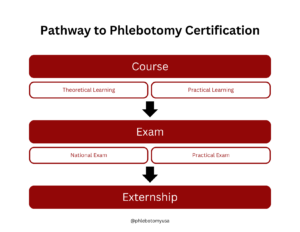05 Jun What to Expect From Your Phlebotomy Course
Taking a phlebotomy course is a great way to learn how to collect blood. These programs are available at hospitals, community colleges, or postsecondary schools. They also offer extensive education on blood collection techniques and patient interaction. For those wondering, “What is a phlebotomy course?” and how it can shape a career in healthcare, here’s what you can expect from a typical phlebotomy training program:
The Fundamentals of Phlebotomy Training
A phlebotomy course is designed to equip students with the essential skills and knowledge needed to become proficient in blood collection. This training is vital because phlebotomists are essential in medical diagnostics and patient care. They are responsible for drawing blood that will be used for a variety of tests, which are often critical in diagnosing and monitoring diseases.
The course typically starts with an overview of the phlebotomist’s role in the healthcare system. Understanding this role is key because it highlights the importance of accuracy, compassion, and professionalism in this career. We focus on the ethical and legal responsibilities that come with handling patient samples, which is a core component of any phlebotomy training program.
Theoretical Learning
In the program, you’ll take classroom lessons on the human body, medical terms, and safety. You’ll also learn how to draw blood in different ways, like using needles or finger pricks. Knowing how the body works, especially the veins and blood circulation, is important because it helps you find the best veins for blood draws. Learning medical terms is also key so you can communicate well with other healthcare workers.
Safety is a big part of phlebotomy. You’ll learn about preventing infections, safely disposing of needles, and avoiding needle injuries. This part of the course also covers patient consent and privacy laws, like HIPAA.
The classroom lessons give you the knowledge you need before practicing real-life skills. Instructors use textbooks and their own experiences to help you understand and apply what you’ve learned.
Practical Learning
The real excitement begins with the hands-on training. Here, you’ll practice drawing blood while an experienced phlebotomy instructor is there to help. Getting real-life practice turns you into an expert blood collector. It will also help you build confidence for when you do phlebotomy on patients.
Students typically start by practicing on training aids before moving on to live draws. This gradual progression allows students to build confidence and hone their skills in a controlled environment. By the time you perform blood draws on actual patients, you’ll have the experience needed to do so with competence and care.
Hands-on training also includes learning how to handle and process specimens correctly. Proper labeling, handling, and transportation of blood samples are critical for accurate test results. Students learn to maintain a clean and organized work area, which is vital for both safety and efficiency.
Certification Exam
After completing the training, you’ll take two certification exams that test you on what you learned. The first test assesses what you learned in the theoretical portion of the course. The second test assesses what you learned in the hands-on portion. You will need to pass both tests to get your phlebotomy certification. Don’t let these tests scare you too much. Your instructor will make sure you are fully prepared to pass.
These exams are essential for becoming a certified phlebotomist. Certification demonstrates that you meet the professional standards required to work in this field and is often a prerequisite for employment in many healthcare settings. While the exams may seem daunting, we make sure that our students are fully prepared through rigorous training and practice.
Clinical Experience
Some phlebotomy training programs offer more training after you complete your tests. This is called a clinical externship. It allows you to work alongside professionals in a real healthcare setting. You’ll observe phlebotomy procedures, interact with patients, and even perform blood draws. This experience helps you prepare even more to get a job in phlebotomy.
You’ll learn how to interact with patients of all ages and backgrounds, handle unexpected situations, and work as part of a healthcare team. The externship is often the final step before entering the workforce and helps bridge the gap between education and employment.
The Promising Job Outlook for Phlebotomy Technicians
The Bureau of Labor Statistics expects phlebotomist jobs to grow by 22% from 2020 to 2030. It’s one of the fastest-growing healthcare careers. This demand comes from the need for blood tests and their role in medical treatments.
Phlebotomy technicians can work in many places, such as hospitals, labs, and blood donation centers. They may also have the chance to work in different settings, like mobile blood units or long-term care facilities. The strong job growth and rewarding nature of the work make phlebotomy an appealing choice for those starting in healthcare.
From Course to Career
Choosing to enroll in a phlebotomy course is a significant step toward a rewarding career in healthcare. Our training programs are designed to provide students with the knowledge, skills, and experience needed to excel as phlebotomists. With a combination of theoretical learning, hands-on training, and real-world experience, our courses guarantee that graduates are well-prepared to meet the demands of this vital profession.
At Phlebotomy Training Specialists, we are committed to offering the highest quality education in phlebotomy. Our instructors bring real-world experience to the classroom and our programs are adjusted to meet the needs of today’s healthcare industry. Whether you’re looking to start a new career or advance in your current role, our phlebotomy school locations across the country offer flexible scheduling and training that can help you achieve your goals.
In short, phlebotomy training teaches you all you need to become a skilled blood-drawing expert. You’ll get classroom lessons, real-world practice, and on-the-job experience. If you love healthcare and helping people, consider taking a phlebotomy course. Why not start now for an exciting career ahead?


